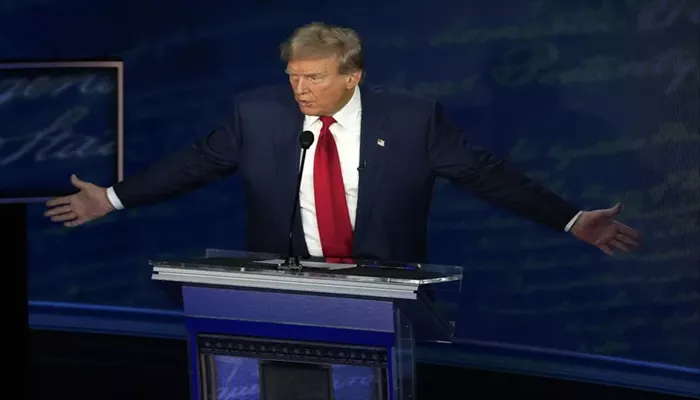Trump’s Baseless Claims about Haitian Immigrants at Debate.
During Tuesday’s presidential debate, former President Donald Trump made a startling and unfounded claim about Haitian immigrants in Ohio, alleging they were eating pets such as dogs and cats.
In response to a question about immigration, Trump stated, “They’re eating the dogs, the people that came in, they’re eating the cats. They’re eating the pets of the people that live there, and this is what’s happening in our country, and it’s a shame.” His remarks were notable for spreading an internet rumor that critics have labeled as racist, reaching millions of viewers.
David Muir, co-moderator of the debate and ABC News anchor, immediately countered Trump’s statements. Muir cited Springfield, Ohio’s city manager, who confirmed there were no credible reports of pets being harmed by the immigrant community.
False Rumors Fuel Immigration Debate
The claims about Haitian immigrants abducting and eating pets have been circulating on social media, particularly focusing on Springfield. Despite these rumors, local police issued a statement on Monday denying any documented incidents of such behavior. “There have been no credible reports or specific claims of pets being harmed, injured, or abused by individuals within the immigrant community,” the statement read.
Republican figures, including Ohio Senator JD Vance, have used these claims to criticize immigration policies. However, Vance later acknowledged the possibility that the rumors might be false.
The unfounded stories partly stem from vague social media posts and unsubstantiated statements at public meetings. One alleged incident, involving a cat attack falsely attributed to a Haitian immigrant, actually occurred 160 miles away in Canton, Ohio. The Canton defendant, charged with animal cruelty, has no known ties to Haiti, according to The Canton Repository.
Immigration and Political Rhetoric
At Tuesday’s city commission meeting in Springfield, immigration was a central topic. Resident Nathan Clark, whose son was killed in a collision with a minivan driven by a Haitian immigrant, criticized Republican politicians for exploiting his son’s death for political gain.
Immigration remains a significant issue in the presidential race. An NBC News poll in April found that 22% of voters view immigration and border security as the most pressing issues, just behind inflation and cost of living concerns.
John Kirby, the White House national security spokesperson, condemned Trump’s comments as a dangerous conspiracy theory that could incite anti-immigrant violence. “There will be people that believe it no matter how ludicrous and stupid it is, and they might act on that kind of information and act on it in a way where somebody could get hurt,” Kirby warned.
Additional Claims and Conspiracy Theories
Trump’s debate performance included various other claims and conspiracy theories. He referenced false rumors about a Venezuelan gang taking over an apartment complex in Aurora, Colorado—rumors that local officials have debunked. He also alluded to conspiracy theories about foreign money influencing the Biden administration, including the discredited claim that Hunter Biden received $3.5 million from the wife of the former mayor of Moscow. This claim, while included in a Republican report, lacks credible evidence.
Overall, Trump’s debate statements were marked by a reliance on unverified rumors and conspiracy theories, highlighting the ongoing issue of misinformation in political discourse.


